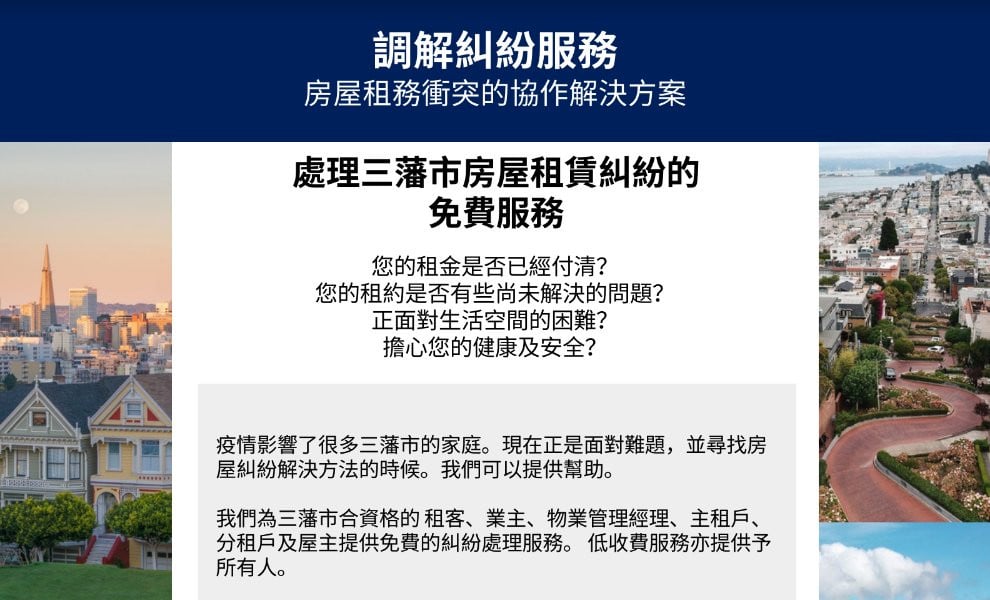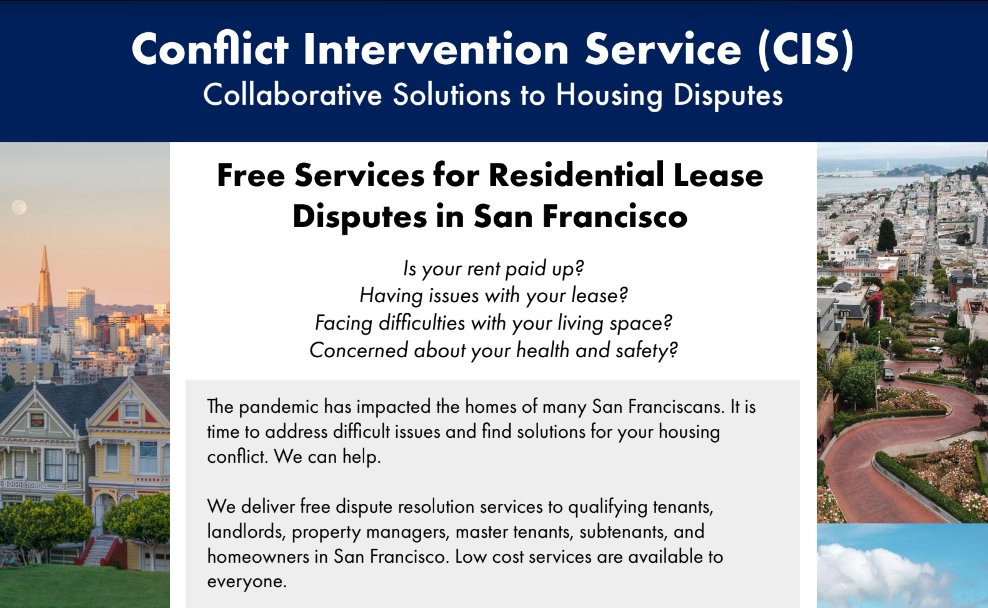Reprinted from our coalition member BASF/CIS. Entire article here.
The voice on the helpline message for the Bar Association of San Francisco’s (BASF) Conflict Intervention Service quaked with fear: “Please help me. I’m an elderly gay man with HIV. My roommate brings a stranger home every night. He laughs when I plead for him to follow the rules. If I catch the virus, I will die.”
It was late in the afternoon on Friday the thirteenth this past March. As panicked calls from distressed people cascaded into the helpline, the Conflict Intervention Service (CIS) faced its greatest challenge.
Earlier in the day, San Francisco Mayor London Breed had announced an eviction moratorium, relieving many residents but triggering confusion at the same time. An unprecedented shelter-in-place order was rumored. It followed on Monday, March 16, effective immediately across the Bay Area.
When people are frightened, they hunker down. They lash out. They act out. When they are jammed together in unwise space-sharing arrangements, fear and trauma make things unmanageable and sometimes dangerous. CIS has helped hundreds of desperate people trapped in bad situations avoid eviction and homelessness through its many service offerings.
The advent of COVID-19 tested CIS, starting with a huge increase in help requests. Rapid response is the program’s touchstone. We guarantee every help request a touchback within twenty-four hours, seven days a week, 365 days a year. Service delivery begins with the first contact. Could we keep up?
John W., the terrified elder with an irresponsible roommate, was stunned when CIS returned his call twenty-two minutes later. He had made a dozen calls over three days before an attorney with the Aids Legal Referral Panel suggested he contact CIS. Terrified, worn out, despairing, John’s surprise was soon matched by the empathy he received from a CIS Conflict Navigator who listened not only for the details but also for the emotions driving the conflict and distress. CIS presented a communication plan for constructive dialogue to address the conflict.
Following the plan, John posted an urgent message on his roommate’s door. The much younger man, Kyle, subleased a room in John’s two-bedroom, one-bath flat in Cole Valley. The message was firm—that unless strangers stopped entering the home, John would need to take further action—while offering an olive branch in CIS language. Kindly and respectfully, John asked Kyle to join him in a facilitated conversation to discuss his concerns.
Deploying ombuds strategies, a CIS attorney-mediator met with Kyle by Zoom on Saturday morning, explaining John’s sincere concerns, and the potential consequences Kyle faced under the circumstances, such as legal action or a restraining order. Having John’s sentiments conveyed without judgment and in a way he could hear them, Kyle owned up to his dismissive attitude about John’s health concerns. A graduate student at UCSF, he also possessed the maturity to change up his game. He agreed to meet with John later in the day.
While Kyle engaged with CIS, one of our mental health licensed mediators prepared John for a direct conversation with his roommate, about whom he had very high emotions. Later that day all four participants were linked up via video conference. Within thirty minutes, Kyle thought it best to take living together during the heightened period of contagion off the table and offered to stay with friends until the crisis passed, while keeping up his rent payments to John. Through swift intervention, entirely online, two members of the LGBTQ community bridged their generational differences, honored their common interests and concerns, and entered into a practical solution for the moment.
The resolution was memorialized in a mediation agreement that was drawn up during the video conference. It was transmitted, signed, and distributed among everyone entirely online, within ninety minutes following the meeting.
Read more here. . .







